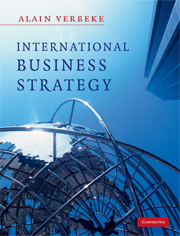Book contents
- Frontmatter
- Contents
- List of figures
- List of case studies
- About the author
- Foreword
- Acknowledgements
- List of abbreviations
- Walkthrough
- Introduction and overview of the book's framework
- Part I Core concepts
- Part II Functional issues
- Part III Dynamics of global strategy
- Conclusion. The true foundations of global corporate success
- Appendix: Suggested additional readings
- Index
Introduction and overview of the book's framework
- Frontmatter
- Contents
- List of figures
- List of case studies
- About the author
- Foreword
- Acknowledgements
- List of abbreviations
- Walkthrough
- Introduction and overview of the book's framework
- Part I Core concepts
- Part II Functional issues
- Part III Dynamics of global strategy
- Conclusion. The true foundations of global corporate success
- Appendix: Suggested additional readings
- Index
Summary
Senior managers in multinational enterprises (MNEs) have a healthy appetite for knowledge that will improve their firm's performance. They want to know which models from the international business strategy literature can actually be applied in their own firm.
Rethinking the classics in international business strategy
Many MNE senior managers hold (or pursue) MBA or executive MBA degrees, and they certainly read whatever is of use in publications such as the Financial Times, the Wall Street Journal, The Economist, Business Week and Fortune. When these managers seek practical advice on improving multinational operations, however, one publication stands out: the Harvard Business Review (HBR).
For at least the past 25 years, HBR has published the frontier knowledge on everything that really matters to senior MNE managers. This explains why so many classroom readers include reprints of HBR articles, and why so many international management teachers use HBR articles in their classes. Apart from the Harvard Business Review, two other academic publications are highly relevant to managers: the MIT Sloan Management Review (SMR), published by the Massachusetts Institute of Technology (MIT), and the California Management Review (CMR), published by the Haas School of Business at the University of California at Berkeley.
The first articles on globalization and its impact on MNE strategy appeared in the early 1980s. The growing economic interdependence between nations – especially the rise of the Triad of the US, Europe and Japan (replacing post-World War II US hegemony) – drove much of this work.
- Type
- Chapter
- Information
- International Business StrategyRethinking the Foundations of Global Corporate Success, pp. 1 - 10Publisher: Cambridge University PressPrint publication year: 2009



